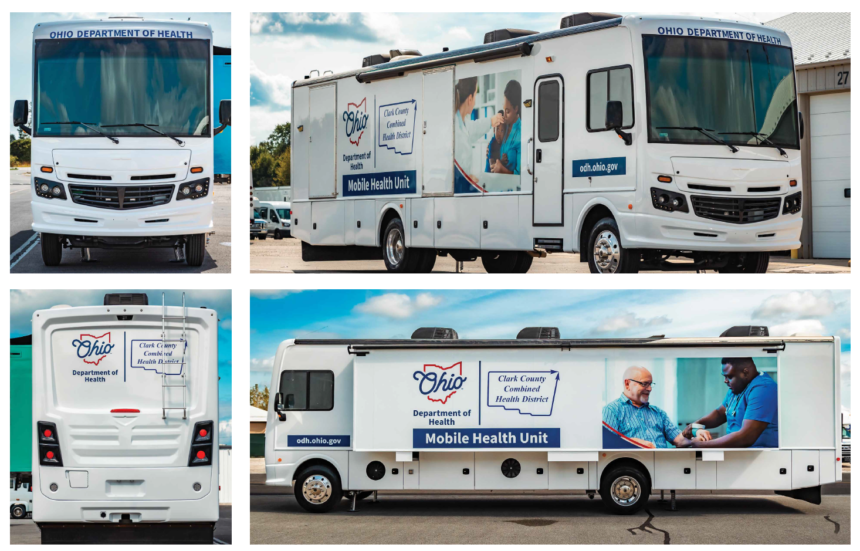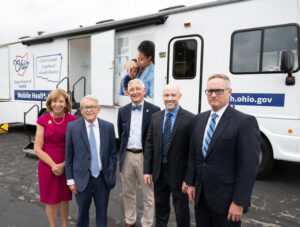If Donald Trump and JD Vance’s attacks endangered the lives of Haitian immigrants in Springfield, they nevertheless helped shed light on the city’s problems.
Since the attacks, the Ohio Governor has announced new programs aimed at improving the situation for Springfield residents.
Governor Mike DeWine and First Lady Fran DeWine unveiled a new mobile health clinic in Springfield, Ohio, aimed at providing expanded access to healthcare for all residents of the Springfield and Clark County areas. The mobile clinic is designed to alleviate the strain on local healthcare services and reduce long wait times that have impacted the community, particularly following the arrival of new residents in Springfield over recent years.
According to local officials in Springfield, the city has received more than 20,000 new residents over the last four years, the vast majority of whom are Haitian immigrants with proper legal documents. The clinic is expected to address critical needs in the community by offering essential services like vaccinations and health screenings.
Governor DeWine made the announcement at the Clark County Combined Health District (CCCHD) on Thursday, joined by Ohio Department of Health (ODH) Director Dr. Bruce Vanderhoff, Clark County Health Commissioner Chris Cook, and Springfield Mayor Rob Rue. According to Governor DeWine, the mobile clinic is part of a larger effort to enhance healthcare access and shorten wait times for those seeking medical care in the area. He emphasized the importance of timely care and the state’s commitment to reducing healthcare bottlenecks that have discouraged residents from seeking necessary treatment.
“The mobile clinic will supplement and expand many of the primary healthcare services that are already available here in Springfield and throughout Clark County,” said Governor DeWine. “Our mission is clear: we will eliminate the backlogs and reduce the wait times for everyone who needs care,” he added.
Springfield’s healthcare system has been struggling under increased demand due to the arrival of thousands of Haitian migrants in recent years. This has resulted in longer wait times for medical appointments and delays in care, according to local officials. The mobile health clinic aims to address these issues by providing an additional resource to the existing healthcare infrastructure.
Appointments for services at the mobile clinic are already being scheduled, and the clinic will initially focus on administering seasonal vaccinations, including those for COVID-19, flu, and respiratory syncytial virus (RSV). Blood pressure screenings and other preventive services will also be offered.
The mobile clinic became operational on the same day as its unveiling and began serving community members that afternoon. This swift deployment came just one week after Governor DeWine directed ODH to collaborate with CCCHD to acquire and set up the clinic in response to the growing demand for healthcare services in Springfield and surrounding areas.
ODH Director Dr. Bruce Vanderhoff expressed the importance of vaccines and preventive care in his remarks, underscoring the role of the new clinic in promoting community health.
“It’s imperative that the residents of this community – adults and children alike – receive services that prevent and treat illness and chronic conditions,” said Dr. Vanderhoff. “I can’t stress enough the importance of vaccines; our strongest weapons in preventing flu, respiratory illness, COVID-19, and other diseases like measles and whooping cough. The fewer people that are vaccinated, the more we run the risk of these contagious diseases being spread throughout the community. This mobile unit being brought to Springfield so quickly under the leadership and vision of Governor DeWine is going to be a game-changer for Springfield to be able to deliver efficient healthcare services to more people.”
The mobile clinic will be stationed at CCCHD and operated by local health district staff, with additional support from ODH. The aim is to reduce wait times significantly, with health officials optimistic that this new resource will make a substantial difference in the community.
Before the arrival of the mobile health clinic, residents often faced a two-month wait for immunizations at local health district offices. Now, with the mobile clinic in place, the goal is to shorten those wait times to two weeks, with hopes of eventually offering same-week appointments or even walk-in visits for vaccines.
Chris Cook, Clark County Health Commissioner, expressed optimism about the positive impact the mobile clinic will have on public health. He also highlighted its potential to encourage people to return to the healthcare system, especially those who may have delayed care due to long wait times.
“I’d like to see this mobile health clinic inspire people in our community who have not seen a doctor in a while to reenter the healthcare system,” Cook said. “We want to be a bridge that gets people in the routine of checking in on themselves so they can be healthy for a long time.”
In addition to its immediate goal of reducing wait times for immunizations, the mobile clinic is part of a broader strategy to provide healthcare to underserved populations in the area. The clinic is expected to be particularly beneficial to residents who face barriers to accessing traditional healthcare facilities, whether due to transportation challenges or other obstacles.
The mobile health clinic represents a collaborative effort between state and local agencies, with the Ohio Department of Health playing a key role in its acquisition and deployment. Governor DeWine and state health officials emphasized that this initiative is part of a larger vision for improving healthcare access across Ohio, particularly in underserved communities.
The mobile clinic will operate on a set schedule, with appointments available Monday through Friday. Residents can make appointments by visiting the CCCHD website or by calling the health district’s main office. The hope is that by offering convenient appointment times and locations, the mobile clinic will serve as a vital resource for those in need of medical care, particularly during flu season and in light of ongoing concerns about COVID-19 and other respiratory illnesses.
At the event, Springfield Mayor Rob Rue praised the governor’s initiative and the collaboration between state and local health officials. He expressed gratitude for the efforts to improve healthcare access in his community and highlighted the importance of the mobile clinic in addressing urgent healthcare needs.
While the primary focus of the mobile clinic is on vaccinations and preventive care, state and local health officials indicated that the scope of services could expand in the future. Depending on community needs, the clinic may offer additional services aimed at managing chronic conditions and promoting overall wellness in the area.
For now, the mobile clinic is seen as a critical step toward alleviating the strain on Springfield’s healthcare system and ensuring that all residents, regardless of their circumstances, have access to the care they need. Health officials are hopeful that the clinic will not only reduce wait times but also encourage more residents to take a proactive approach to their health.
The introduction of the mobile health clinic is just one part of Governor DeWine’s broader efforts to improve healthcare access across Ohio. In recent months, the governor has emphasized the need for creative solutions to address the healthcare challenges facing many communities in the state, particularly in the wake of the COVID-19 pandemic.
As Springfield residents begin to access services at the mobile clinic, health officials will monitor its effectiveness and make any necessary adjustments to ensure that it continues to meet the needs of the community. Governor DeWine and other leaders expressed confidence that the mobile clinic will make a lasting impact on public health in Springfield and beyond.
In addition to providing vaccines and screenings, the clinic will also serve as a platform for public health education, offering residents information on disease prevention, healthy living, and other topics related to wellness.








